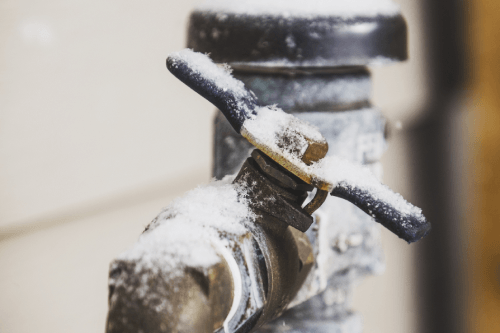Ways to Avoid Frozen Plumbing in Winter: Expert Tips
Ways to Avoid Frozen Plumbing in Winter: Expert Tips
Blog Article
Everyone will have their own individual idea in relation to Helpful Tips to Prevent Frozen Pipes this Winter.

Winter can ruin your plumbing, particularly by freezing pipes. Below's just how to stop it from taking place and what to do if it does.
Introduction
As temperatures drop, the risk of frozen pipelines rises, potentially causing pricey repairs and water damages. Understanding how to prevent icy pipes is vital for property owners in cold environments.
Understanding Frozen Pipelines
What causes pipes to ice up?
Pipelines freeze when subjected to temperature levels listed below 32 ° F (0 ° C) for extended periods. As water inside the pipes freezes, it expands, putting pressure on the pipe walls and possibly causing them to burst.
Threats and problems
Icy pipelines can bring about water supply disturbances, home damage, and pricey fixings. Ruptured pipes can flooding homes and trigger comprehensive structural damages.
Signs of Frozen Piping
Determining icy pipelines early can prevent them from rupturing.
How to determine icy pipes
Try to find decreased water circulation from taps, unusual odors or sounds from pipes, and noticeable frost on subjected pipes.
Avoidance Tips
Insulating susceptible pipes
Wrap pipelines in insulation sleeves or utilize warm tape to safeguard them from freezing temperatures. Focus on pipes in unheated or external locations of the home.
Heating strategies
Maintain indoor areas appropriately warmed, especially locations with plumbing. Open closet doors to allow cozy air to flow around pipelines under sinks.
Protecting Outdoor Plumbing
Yard hoses and outside faucets
Detach and drain pipes yard hoses before wintertime. Install frost-proof spigots or cover outdoor taps with insulated caps.
What to Do If Your Pipelines Freeze
Immediate activities to take
If you believe icy pipelines, keep taps available to alleviate stress as the ice thaws. Use a hairdryer or towels soaked in hot water to thaw pipes gradually.
Long-Term Solutions
Structural changes
Take into consideration rerouting pipes away from exterior walls or unheated locations. Add added insulation to attics, cellars, and crawl spaces.
Updating insulation
Buy high-quality insulation for pipes, attic rooms, and walls. Appropriate insulation aids maintain consistent temperatures and reduces the threat of icy pipelines.
Final thought
Avoiding frozen pipes needs positive measures and quick reactions. By understanding the reasons, indicators, and safety nets, home owners can secure their plumbing throughout cold weather.
Helpful Tips to Prevent Frozen Pipes this Winter
UNDERSTANDING THE BASICS: WHY PIPES FREEZE AND WHY IT’S A PROBLEM
Water freezing inside pipes is common during the winter months, but understanding why pipes freeze, and the potential problems it can cause is crucial in preventing such incidents. This section will delve into the basics of why pipes freeze and the associated problems that may arise.
THE SCIENCE BEHIND FROZEN PIPES
When water reaches freezing temperatures, it undergoes a physical transformation and solidifies into ice. This expansion of water as it freezes is the primary reason pipes can burst. As the water inside the pipe freezes, it expands, creating immense pressure on the walls. If the pressure becomes too great, the pipe can crack or rupture, leading to leaks and water damage.
FACTORS THAT CONTRIBUTE TO PIPE FREEZING
Low Temperatures: Extremely cold weather, especially below freezing, increases the risk of pipes freezing. Uninsulated or Poorly Insulated Pipes: Pipes located in unheated areas, such as basements, crawl spaces, or attics, are more prone to freezing. Insufficient insulation or lack of insulation altogether exacerbates the problem. Exterior Wall Exposure: Pipes running along exterior walls are susceptible to freezing as they encounter colder temperatures outside. Lack of Heating or Temperature Regulation: Inadequate heating or inconsistent temperature control in your home can contribute to frozen pipes. PROBLEMS CAUSED BY FROZEN PIPES
- Pipe Bursting: As mentioned earlier, the expansion of water as it freezes can cause pipes to burst, resulting in significant water damage.
- Water Damage: When pipes burst, it can lead to flooding and water damage to your property, including walls, ceilings, flooring, and personal belongings.
- Structural Damage: Prolonged exposure to water from burst pipes can compromise the structural integrity of your home, leading to costly repairs.
- Mold and Mildew Growth: Excess moisture from water damage can create a favorable environment for mold and mildew growth, posing health risks to occupants.
- Disrupted Water Supply: Frozen pipes can also result in a complete or partial loss of water supply until the issue is resolved.
WHY CERTAIN PIPES ARE MORE PRONE TO FREEZING
- Location: Pipes located in unheated or poorly insulated areas, such as basements, crawl spaces, attics, or exterior walls, are at higher risk of freezing.
- Exterior Pipes: Outdoor pipes, such as those used for irrigation or exposed plumbing, are particularly vulnerable to freezing as they are directly exposed to the elements.
- Supply Lines: Pipes that carry water from the main water supply into your home, including the main water line, are critical to protect as freezing in these lines can affect your entire plumbing system.
- Underground Pipes: Pipes buried underground, such as those connected to sprinkler systems or outdoor faucets, can be susceptible to freezing if not properly insulated.
https://busybusy.com/blog/helpful-tips-to-prevent-frozen-pipes-this-winter/
:strip_icc()/snow-outdoor-faucet-pipes-4af65d1e5e904fb1aa7bf74071fe5d89.jpg)
We had been guided to that article about Preventing and dealing with frozen pipes through someone on our other web address. Those who liked our page please don't forget to share it. Many thanks for going through it.
Click Here Report this page